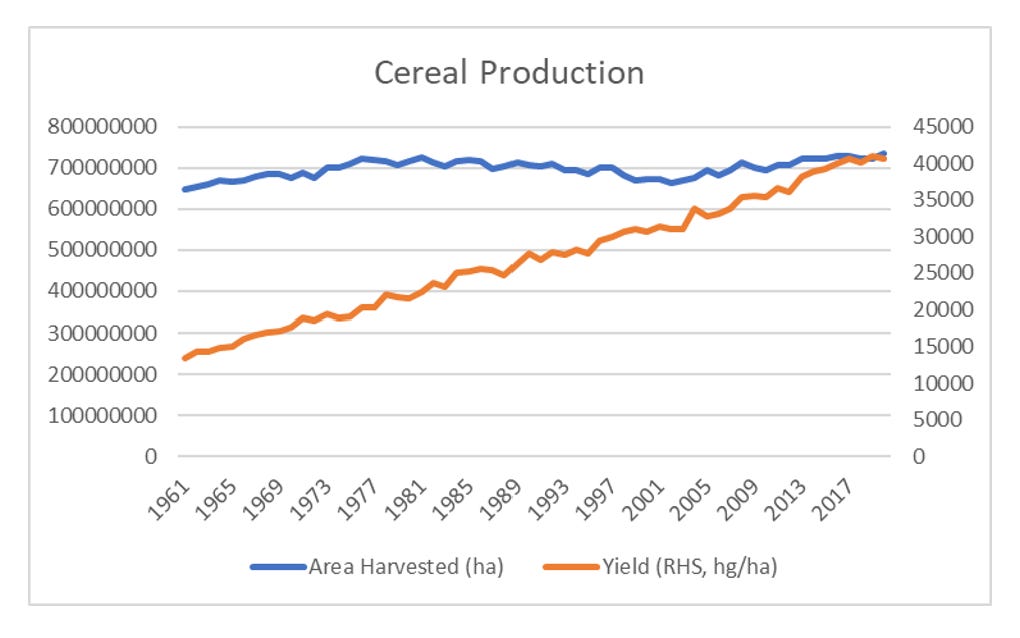One of the many lessons I have learnt from the market over the years is that if everyone is worried about a problem, it is a) likely already priced into markets and b) someone out there is already working on solving it. A good example is the Malthusians in the 1970s. The Malthusian believed that we were about to enter of cycle of mass famine. There were two main drivers. One was that world population was growing so quickly, that it would outstrip the ability to produce food. One of the drivers of this fear was that most arable land was already been used to grow crops, which meant that ratio of people to land was moving in and unsustainable way. The big mistake that this analysis made was that the yield (amount of cereal produced on a hectare of land) had increased from 13,500 hg/ha in 1861 to 40,000 hg/ha in 2020 (data taken from UNFAO). The irony of the Malthusian analysis was that crop yields were already rising in the 1960s, but they chose to ignore that data point.
Contrary to expectations, grain and food was typically in excess. As recently as 2020, wheat was still trading at USD4 a bushel - a price first seen in 1972.
Now the world is gripped by fears of collapsing populations. The principal driver of this fear is collapsing total fertility rate. Any number below 2 implies a long term decline. The UK population has not declined yet, as it has been supplemented by immigration, but nations like Japan with limited immigration have already seen their population decline.
One thing the UK data makes clear is that the baby boom, and subsequent baby bust are effected mainly by the age a woman becomes a mother. After World War II the median age of a mother fell from 28 to 25, and today is nearing 32.
If we look at data from the UK regulator of IVF and other fertilisation treatments (Human Fertilisation and Embryology Authority - www.hfea.gov.uk) which has been collecting data on IVF since treatments began, we can see that birth rates using IVF have improved for all ages, but having success with IVF over the age of 40 is still slim.
This seems to imply the necessity of a “Handmaid’s Tail” style revolution is needed to boost fertility rates. However, the HFEA provide very interesting data on birth rate using donor eggs. When a woman uses a donor egg, IVF birth rates are above 30% for all ages, including 45 to 50.
What is this data point saying? It is not the age of the woman that reduces the chances of pregnancy, it is the age of the egg. This makes a lot of sense, as women carry all their eggs through their entire life, and from 35 onwards the quality of the average egg declines. IF the decline in fertility rates is solely driven by women beginning motherhood later, and the obvious answer is to freeze eggs when young, and use then when older. HFEA data shows that trend is already taking hold.
So if the UK government decided the “baby bust” was a crisis on par with climate change, then one obvious policy would be the NHS to fund the freezing of eggs for any women between the age of 30 and 35, and to agree to freeze them for up to 20 years. How much would this cost? I estimate there are around 2m women aged 30 to 35. I am guessing take up at 30%. Even if its free, it still an invasive operation, and if you already had say 2 children you may see no need. HFEA estimates a cost of £6000 to freeze and then unfreeze eggs. Assuming 600,000 women take it up, we are looking at start up cost of roughly £4bn, and running costs of £1bn a year. This compares to a NHS budget forecast at £199bn this year.
I have used the UK, as its data is very good, but there is no reason this data does not extend to other countries. The main point, is that for a motivated government, they could remove the physical constraints on increasing fertility rates. There will remain financial constraints, but I feel that the move to work from home culture may well help, with parents able to do more childcare while working.
Finally, I feel that we are moving to an age of confrontation between China and the US. Could we enter an age of “birth wars”? Where both countries try and boost their population? For those who remember the US and USSR competing at the Olympics to try and prove the superiority of their systems, this is not that far fetched. I am pretty sure long term fears of a baby bust, will be as correct at the Malthusian fear of mass starvation - that is totally wrong.









